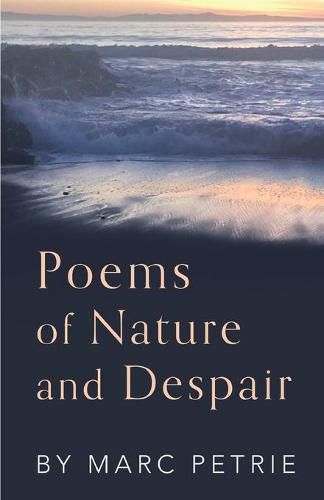Readings Newsletter
Become a Readings Member to make your shopping experience even easier.
Sign in or sign up for free!
You’re not far away from qualifying for FREE standard shipping within Australia
You’ve qualified for FREE standard shipping within Australia
The cart is loading…






This title is printed to order. This book may have been self-published. If so, we cannot guarantee the quality of the content. In the main most books will have gone through the editing process however some may not. We therefore suggest that you be aware of this before ordering this book. If in doubt check either the author or publisher’s details as we are unable to accept any returns unless they are faulty. Please contact us if you have any questions.
In the introduction to Marc Petrie’s Poems of Nature and Despair he states I defy those who separate math and science from literature and art, as all true poets have, and will. And, like many of us, he had to borrow
a horn/from the fabulous/siren for that which cannot be explained. Whether said in pride or humility, poets are usually at a loss to explain their craft. Watching his six-year-old son sleep, he wishes: I would like to learn/how not to read. And the title of the poem is Becoming truly literate. The paradox is only apparent, the reader understands. Unlike some other poets, who use the word nature as pure flimflam, Marc Petrie’s Nature in the title is amply justified. His evocations are so sharp and precise that I am tempted to call them concrete evidence or even data:
In Roaming the rooftops, we experience the intense tapping of rain/against the red tiles.
On Santa Cruz Island, 2018,
[t]he eagle dives the length, /plunges talons into fish/to feed its young. In Intimate Landscape, as one extensive example, ‘brilliant light/just under the cloud/splits into/small spectral colors. Here we have the scientific gaze that is and has become pure poetry. But at the same time, it becomes transcendence, as in John Muir’s writings. Petrie glorifies the nature of California: Big Sur, Yosemite, Santa Cruz Island, mesas and sierras, and the ever-present Ocean. And it is through nature, anchored in time and space, that the human element enters: both are tightly connected. In Poems of Nature and Despair, Petrie enacts the necessary human struggle from bitter human despair to ephemeral human delight. The poet, as in the Rilke he quotes, is Orpheus. For all we know, hell may be the Blue Grotto of Capri. Inner and outer world converge. In Days of Awe, he writes: I lean against the wooden fence/Silent as a cliff. Nature is not merely a donnee of the outer world, it is the soul itself. Marc Petrie is one of our most lucid and striking poets of landscape, natural and human, and for that we are grateful.
-Margaret Saine, Board Member and Editor, California State Poetry Society, Days of Awe and The Cumsy
Child (German Poems). She has published three books of poetry in English as well as six haiku chapbooks
in five languages.
$9.00 standard shipping within Australia
FREE standard shipping within Australia for orders over $100.00
Express & International shipping calculated at checkout
This title is printed to order. This book may have been self-published. If so, we cannot guarantee the quality of the content. In the main most books will have gone through the editing process however some may not. We therefore suggest that you be aware of this before ordering this book. If in doubt check either the author or publisher’s details as we are unable to accept any returns unless they are faulty. Please contact us if you have any questions.
In the introduction to Marc Petrie’s Poems of Nature and Despair he states I defy those who separate math and science from literature and art, as all true poets have, and will. And, like many of us, he had to borrow
a horn/from the fabulous/siren for that which cannot be explained. Whether said in pride or humility, poets are usually at a loss to explain their craft. Watching his six-year-old son sleep, he wishes: I would like to learn/how not to read. And the title of the poem is Becoming truly literate. The paradox is only apparent, the reader understands. Unlike some other poets, who use the word nature as pure flimflam, Marc Petrie’s Nature in the title is amply justified. His evocations are so sharp and precise that I am tempted to call them concrete evidence or even data:
In Roaming the rooftops, we experience the intense tapping of rain/against the red tiles.
On Santa Cruz Island, 2018,
[t]he eagle dives the length, /plunges talons into fish/to feed its young. In Intimate Landscape, as one extensive example, ‘brilliant light/just under the cloud/splits into/small spectral colors. Here we have the scientific gaze that is and has become pure poetry. But at the same time, it becomes transcendence, as in John Muir’s writings. Petrie glorifies the nature of California: Big Sur, Yosemite, Santa Cruz Island, mesas and sierras, and the ever-present Ocean. And it is through nature, anchored in time and space, that the human element enters: both are tightly connected. In Poems of Nature and Despair, Petrie enacts the necessary human struggle from bitter human despair to ephemeral human delight. The poet, as in the Rilke he quotes, is Orpheus. For all we know, hell may be the Blue Grotto of Capri. Inner and outer world converge. In Days of Awe, he writes: I lean against the wooden fence/Silent as a cliff. Nature is not merely a donnee of the outer world, it is the soul itself. Marc Petrie is one of our most lucid and striking poets of landscape, natural and human, and for that we are grateful.
-Margaret Saine, Board Member and Editor, California State Poetry Society, Days of Awe and The Cumsy
Child (German Poems). She has published three books of poetry in English as well as six haiku chapbooks
in five languages.